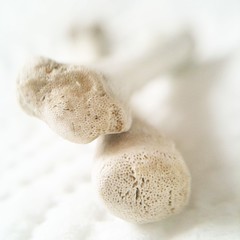 Image by Theen ... via Flickr
Image by Theen ... via Flickr
There seems
to be an ongoing controversy regarding the role of a diet high in animal protein and bone health. There have
been several recent studies that elaborate on this topic. However, in sifting through the scientific
literature, it is a well-established fact that protein does cause the body to
lose calcium. One study in particular, the
Harvard Nurses Health Study, found that those who consumed five or more servings
of red meat per week had significantly increased fracture risk. Those who received their protein from plant
sources had no increased risk. (Protein Consumption and Bone Fractures in
Women, Feskanich et al. 1996, American
Journal of Epidemiology, 143, 472).
The
question is—does plant protein have the same bone-robbing effect as animal
protein? Some studies, as the one
mentioned above, show that plant protein does not increase the risk of
fractures but there are contradictory studies on this subject. Some of the confusion and controversy about
animal protein vs. plant protein and bone loss is partly due to the fact that
the meat, milk, egg, and feed-crop production industries support many of these
papers through grants. It is not surprising that the conclusion of papers sponsored
by these self-serving industries contain biased opinions about the superiority
of animal protein.
In
reality, there are many ingredients that go into the making of healthy bones—not
just protein. The alkalizing effects of
a diet plentiful in fruits and vegetables offset the calcium-stealing effects
of protein. To that end, vegetarians
need to include in their diet foods rich in calcium and other essential minerals,
make sure vitamin D levels are high, and there is increasing evidence that
weight-bearing exercises are especially important in keeping bones healthy and
strong.


No comments:
Post a Comment